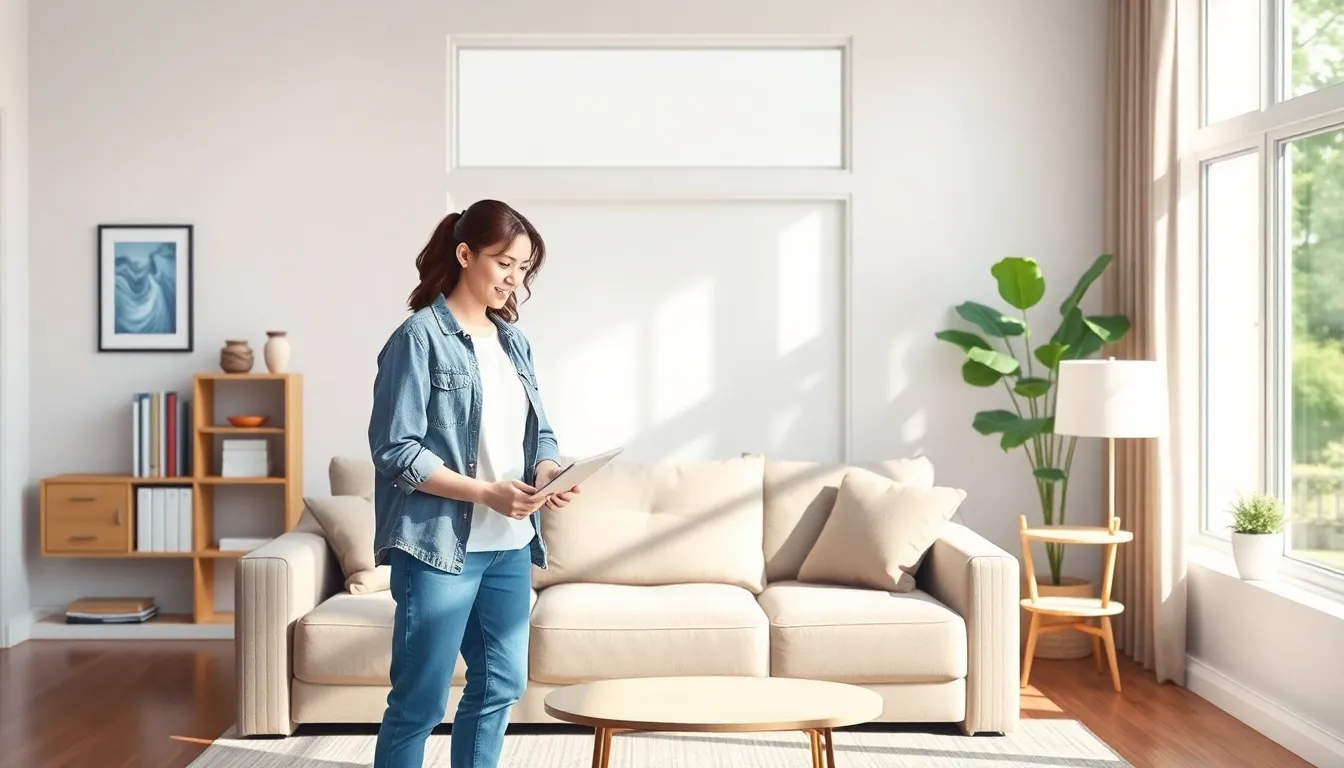Table of Contents
ToggleWhen it comes to the age-old debate of renting versus buying, opinions can get as heated as a game day rivalry. On one side, you’ve got the freedom-loving renters who enjoy flexibility and minimal responsibilities. On the other, the proud homeowners who revel in the joy of mowing their own lawns—because nothing says “adulting” like a freshly cut yard.
Overview of Renting and Buying
Renting offers distinct advantages in today’s housing market. Flexibility forms a core benefit, allowing individuals to relocate without the burden of selling a property. Financially, renters face fewer upfront costs compared to buyers since security deposits are usually less than a down payment. Responsibilities also play a crucial role; renters avoid property maintenance expenses often borne by homeowners.
Homeownership, on the other hand, brings significant stability. People investing in a home build equity over time, fostering long-term financial security. Tax benefits associated with mortgage interest can also enhance a homeowner’s financial situation, providing potential deductions that renters miss. Community involvement often strengthens among homeowners, leading to a sense of belonging and pride in one’s neighborhood.
Market conditions influence decisions between renting and buying. Economic factors, such as interest rates, can make homeownership more appealing when rates drop. Conversely, a rising real estate market may make opting to rent a smarter financial choice in the short term. Each option carries risks and rewards, necessitating careful consideration of individual circumstances.
Demographics further contribute to this decision-making process. Younger adults may prioritize renting due to job mobility and lifestyle preferences, while families often seek stability provided by homeownership. Ultimately, personal goals and financial situations dictate the best course of action.
Financial Considerations


Comparing the financial implications of renting versus buying reveals essential factors that influence personal decisions. A comprehensive look at initial costs and long-term expenses demonstrates the advantages and challenges of each option.
Initial Costs
Renting typically requires a security deposit and perhaps the first month’s rent upfront. Lease agreements usually demand less immediate cash compared to purchasing a home, which often involves down payments that can range from 3% to 20% of the property’s price. Closing costs, which can sum up to 5% of the home’s value, add to the financial burden of buying. While renters may face fewer initial financial hurdles, buyers invest significantly more upfront to secure a permanent residence.
Long-term Expenses
Homeownership entails ongoing costs such as mortgage payments, property taxes, and homeowner’s insurance. These recurring expenses can accumulate over time, impacting buyers’ budgets. In contrast, renting offers predictable monthly payments and freedom from maintenance costs, which often burden homeowners. Renters are typically not responsible for repairs, which can save significant money in the long run. Weighing these long-term costs influences the choice between renting and buying, impacting overall financial stability.
Flexibility and Stability
Renting offers significant advantages in terms of flexibility and mobility. Many renters enjoy the freedom to relocate as their situations change, whether for job opportunities or lifestyle preferences. This flexibility allows for quick decisions regarding housing without the commitment associated with buying.
Mobility Benefits of Renting
Renters experience a simpler process when moving. Short-term leases often provide the option to change residences every year or even more frequently. Professionals in industries that require mobility, such as consulting, frequently opt for rentals to accommodate their changing work locations. Moreover, renters face fewer financial penalties when deciding to move, as they aren’t locked into long-term commitments. This mobility tends to attract young professionals and those prioritizing work-life balance.
Stability of Homeownership
Homeownership provides a sense of stability that many individuals find appealing. Owning a home often symbolizes a long-term investment and fosters deeper community connections. Homeowners build equity over time, giving them a financial advantage as property values increase. In addition, fixed mortgage rates can lead to predictable monthly payments, allowing for long-term financial planning. Families frequently seek this stability, as it offers a stable environment for children to grow and flourish. Homeownership also often confers pride and a sense of belonging, aspects that many renters may find lacking.
Responsibilities and Maintenance
Understanding responsibilities and maintenance obligations is crucial when comparing renting and buying a home. Each option comes with distinct duties that impact daily life.
Landlord Responsibilities
Landlords maintain a range of responsibilities for their rental properties. They ensure the premises comply with safety and housing codes. Timely repairs for plumbing, heating, and electrical issues fall under the landlord’s duties. Renters don’t face the burden of covering maintenance costs directly, leading to less financial stress. Property inspections are often part of a landlord’s role, ensuring the environment remains safe and livable for tenants. Ultimately, landlords handle the upkeep, allowing renters to focus on their lifestyles without the headaches of home maintenance.
Homeowner Maintenance Duties
Homeowners carry the weight of various maintenance duties. Regular yard work, roof inspections, and appliance repairs become ongoing responsibilities. Managing landscaping and ensuring the property’s exterior remains appealing demands time and effort. Homeowners bear the costs associated with repairs and upgrades, which can lead to significant financial implications. Responsibilities can include seasonal maintenance tasks, such as gutter cleaning and furnace checks. When unforeseen issues arise, homeowners must be prepared for unexpected expenses. Maintaining a home creates a sense of ownership but also requires commitment to ongoing care.
Investment Potential
Considering investment potential, both renting and buying offer distinct advantages.
Equity and Property Value Appreciation
Building equity occurs primarily through homeownership. As a homeowner pays their mortgage, the property’s value can appreciate significantly. Historically, homes appreciate at an average rate of 3.5% annually. While the housing market can fluctuate, long-term gains often favor those who invest in property. Renters do not benefit from this appreciation, as they lack ownership rights and equity development. The ability to leverage home equity for loans or additional investments serves as another reason some choose to purchase.
Rental Income Opportunities
Investing in rental properties creates opportunities for generating passive income. Property owners can rent out homes or apartments, providing consistent cash flow. In 2022, the average annual return on rental properties reached about 10.6%, offering substantial financial rewards. Expense management can also contribute to profitability as landlords handle maintenance and tenant needs. Meanwhile, renters typically miss out on these income possibilities, focusing solely on their monthly payments. Purchasing, therefore, can transform into a strategic financial investment rather than simply a place to live.
Choosing between renting and buying a home involves weighing various factors that align with personal circumstances and financial goals. Renters enjoy flexibility and lower responsibilities while homeowners benefit from stability and the potential for equity growth.
Understanding the market dynamics and individual needs plays a crucial role in this decision-making process. Whether one values the freedom to relocate or the commitment of homeownership, each option presents unique advantages. Ultimately, it’s about finding the right balance between lifestyle preferences and financial aspirations.





